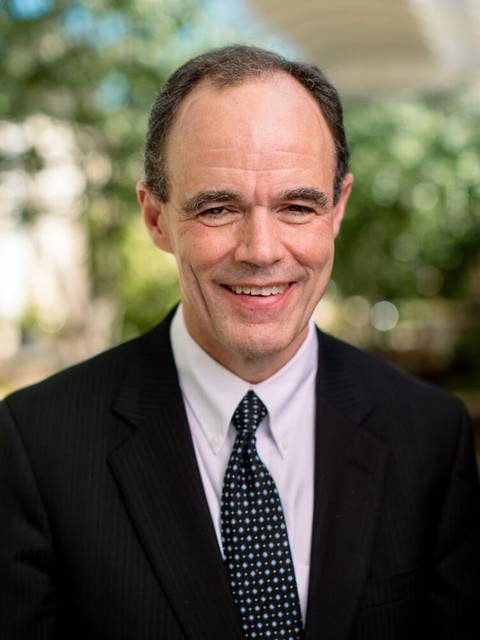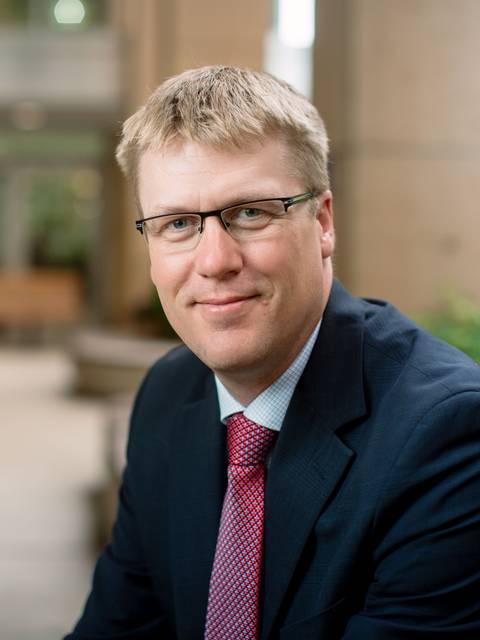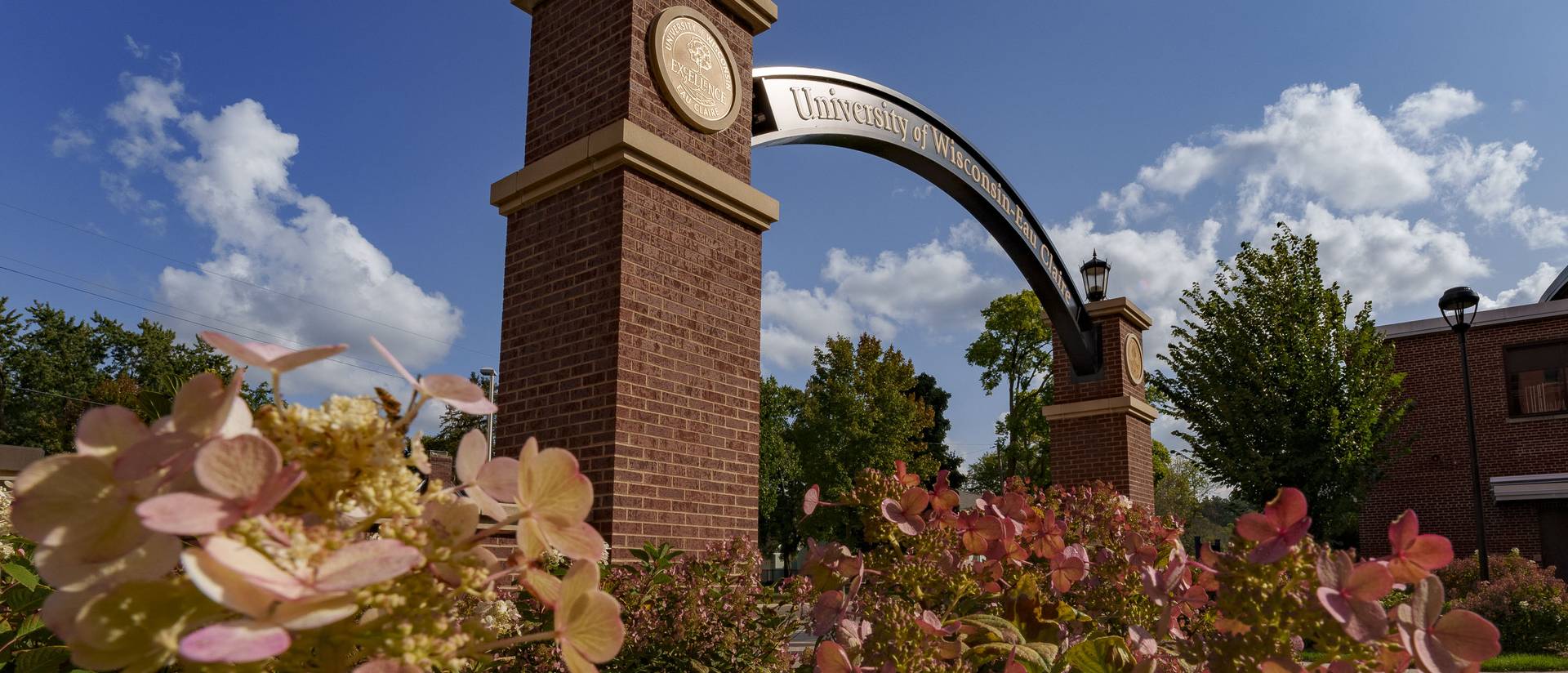Two Mayo Clinic Health System physicians will receive honorary doctorates at the University of Wisconsin-Eau Claire’s spring commencement ceremonies on May 18.
Dr. Richard Helmers, regional vice president for Mayo Clinic Health System in Wisconsin, and Dr. Tim Nelson, director of innovation for Mayo Clinic Health System Northwest Wisconsin, will receive honorary doctorates of science. Nelson will deliver the “Charge to the Class” at the 9 a.m. and 1:30 p.m. commencement ceremonies and Helmers will deliver the “Charge to the Class” at the 5:30 p.m. ceremony.
Helmers and Nelson are the fourth and fifth recipients of an honorary doctorate from the university.

Dr. Richard Helmers, regional vice president for Mayo Clinic Health System in Wisconsin
Helmers was enthusiastic in his work to initiate the research collaboration between UW-Eau Claire and Mayo Clinic Health System in 2017, which was just the second such agreement between Mayo Clinic Health System and an academic institution, says Chancellor James Schmidt. Nelson, a UW-Eau Claire graduate, has been an integral part of the collaboration as the innovation director who has firsthand experience with the university’s faculty and its focus on student success, Schmidt says.
“Our groundbreaking collaboration between UW-Eau Claire and Mayo Clinic has exceeded all expectations thanks to the leadership of Dr. Helmers and Dr. Nelson,” Schmidt says. “Their collective commitment to our mission and continued passion for all that we have and can achieve further confirms my belief that we are only limited by our vision. Recognizing these two colleagues and leaders with honorary doctorates is an important testament on our future.”
Helmers has served as regional vice president for Mayo Clinic Health System in Wisconsin since 2017 after being vice dean for practice at Mayo Clinic for five years. Previously, he served for more than 20 years at Mayo Clinic in Arizona.
“I am deeply honored to receive this prestigious recognition from the University of Wisconsin-Eau Claire,” Helmers says. “As collaborators in research and education, Mayo Clinic Health System and UWEC have been at the forefront of groundbreaking discoveries and transformative learning experiences. This honorary doctorate underscores the vital role that collaboration plays in advancing knowledge and shaping our world. I am committed to continuing our shared mission of excellence and innovation.”
Helmers has shown a commitment to enhancing UW-Eau Claire’s reputation and helping to provide exceptional opportunities for students and faculty, according to those who nominated him for the honorary degree.
“Simply put, UW-Eau Claire would not be enjoying the multiyear Mayo partnership without Dr. Helmers’ leadership and commitment,” nominators said. “The initial five-year partnership was extended in 2022 to another 10 years, solidifying its future. Dr. Helmers also serves as a member of the university’s National Leadership Council, where his professional perspectives on health care in the country as well as the strategic initiatives of Mayo are invaluable.”
Under Helmers’ leadership, Mayo Clinic Health System has funded $11 million for the diagnostic imaging sports medicine facility under construction at the Sonnentag Center, committed $13.7 million for space in the new Science and Health Sciences Building and committed to support 10 high-ability Blugold Biomedical Innovator students each year at the university. Mayo Clinic Health System also provides administrative oversight for UW-Eau Claire’s Student Health Service, primary medical oversight for Blugold Athletics and medical leadership for the university’s master’s degree in athletic training.

Dr. Tim Nelson, director of innovation for Mayo Clinic Health System Northwest Wisconsin
Nelson, an Osseo native and 1998 graduate of UW-Eau Claire in biochemistry and molecular biology, is one of UW-Eau Claire’s most accomplished graduates. Nelson, who has been director of innovation for Mayo Clinic Health System Northwest Wisconsin since 2017, says he is humbled, honored and grateful for the honorary doctorate recognition.
“It’s humbling because there are so many people who are worthy of receiving an award like this,” Nelson says. “To think that the university has seen value in our partnership really ignites me to do more of what we’re doing together. I feel like we’re just scratching the surface of what’s possible.”
In his director of innovation role, Nelson manages the multimillion-dollar research collaboration with UW-Eau Claire through the engagement of undergraduate researchers, university faculty and the medical organization’s physicians.
“The results of the partnership have far exceeded all expectations, thanks in no small measure to Dr. Nelson’s commitment to continuous innovation and creativity,” according to those who nominated Nelson for the honorary doctorate. “To date, the partnership has initiated more than 100 research and clinical innovation projects, all with the goal of improving patient health care outcomes.”
Nelson says his research work with Blugold Biomedical Innovators Program students reminds him of the meaningful relationships he had with faculty as an undergraduate, where he was able to have laboratory-based research experiences “that really set me on a trajectory that I’m still on today.”
“It’s like any partnership or relationship — if it’s a one-way street you get burned out, you get discouraged and you ultimately stop doing things,” Nelson says. “When you feel like you’re getting more out of it than you are giving, you keep coming back. I think I get more out of interacting with these students than I put into it. It’s energizing. It’s the way it should be. It’s such a gift to be in a position where you feel that way.”
Nelson’s professional career has been highlighted by firsts that have established his national reputation as an innovator. He was director of the Todd and Karen Wanek Family Program for Hypoplastic Left Heart Syndrome that led the first clinical trial in the country to use stem cells to treat congenital heart disease in newborns.
In 2021, Nelson founded Heartworks, an entity that focuses on curing congenital heart defects and conducting clinical trials across a network of providers.
“His career has been defined by his interest in what is not in textbooks,” nominators said. “He has focused on creating teams to learn and develop products in medicine that currently do not exist.”
